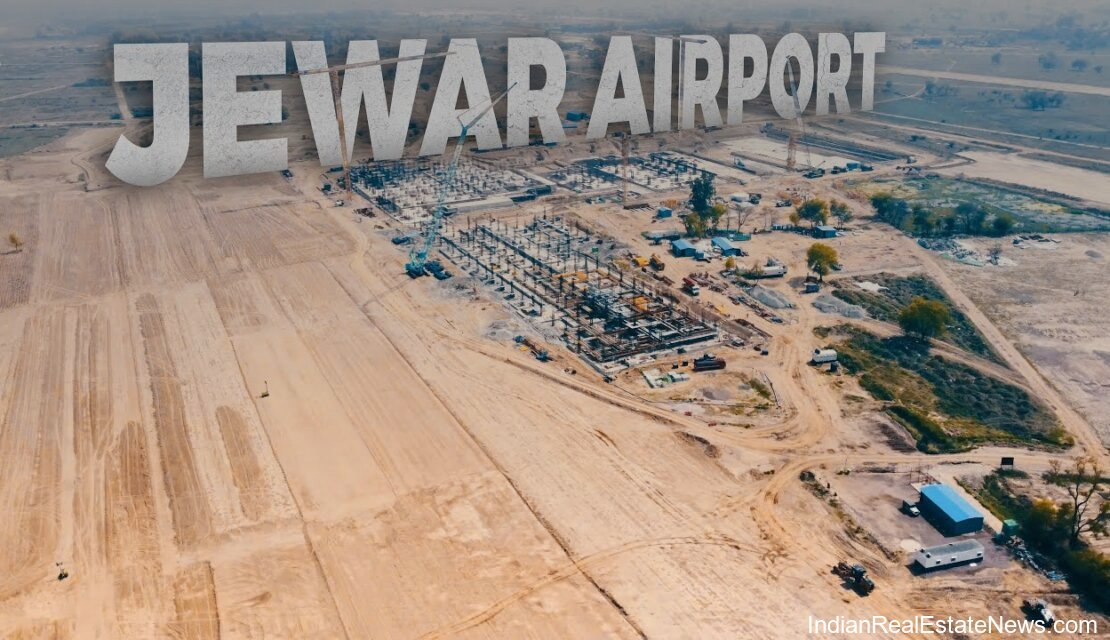The landscape of western Uttar Pradesh is on the cusp of transformation with the upcoming inauguration of the Noida International Airport in Jewar, scheduled for September 2025. As India’s largest new airport, this project is already acting as a catalyst for real estate growth in the region, sparking a wave of development and investment that extends far beyond its immediate vicinity. With the airport’s launch, Noida and surrounding areas are poised to become a major economic hub, reshaping the real estate market and offering exciting opportunities for investors and residents alike.
Real Estate Upturn in Jewar (Noida)
The announcement of the Noida International Airport has dramatically shifted the property landscape in Greater Noida and the Yamuna Expressway region. Land prices around the airport have doubled, spurring developers to acquire approximately 390 acres in the last year alone, with transactions totaling nearly Rs. 2,340 crores. Current land rates are reaching Rs. 5 to 6 crore per acre.
“The airport’s development has generated enormous interest among small developers and end-users, with the Yamuna Expressway Industrial Development Authority’s (YEIDA) master plan driving urban development,” said a government spokesperson.
YEIDA has earmarked over 13,300 acres across 41 villages for integrated development, paving the way for new residential areas and industrial cities.
Infrastructure of the Noida International Airport
The airport is not only a transportation hub but also a catalyst for regional infrastructure enhancement. A 31 km expressway offshoot of the Delhi–Mumbai Expressway will link Jewar to Faridabad and Delhi, while the future Ghaziabad–Jewar Regional Rapid Transit System (RRTS) corridor is expected to enhance connectivity by 2027–2030.
“These connectivity projects are crucial for integrating the airport with the NCR, making it an attractive hub for investors,” noted a transport official.
Transport authorities have also collaborated to establish city bus services and taxi networks, further boosting the area’s accessibility.
Launch Date of Jewar International Airport
The airport’s construction, with an estimated cost of Rs. 29,650 crore, is progressing in four phases. Phase I includes a terminal and a runway with a capacity of 12 million passengers annually. Initially delayed, the airport is set to open in September 2025 for domestic flights and cargo operations, with international flights commencing in November 2025. This milestone is expected to significantly stimulate demand across residential, commercial, hospitality, and industrial sectors.
Investment Ripples Across Segments
- Residential Demand & Capital Appreciation: Small investors and end-users have experienced 15–25% price appreciation. With YEIDA’s new sectors 5, 8, and 9 designated for residential and institutional purposes, the demand for housing is set to rise.
- Commercial & Industrial Growth: The airport is fostering the development of an aerotropolis, encompassing logistics parks, corporate campuses, and mixed-use developments. Notable projects include a Rs. 3,706 crore HCL/Foxconn facility, promising 2,000 jobs.
- Recreational & Tourism Development: Plans for a fintech zone, a Japanese and Korean industrial city, and a 2,500-acre recreational node are underway, further enhancing the area’s appeal.
Connectivity Enhancements
- New expressway connecting the airport to the Delhi–Mumbai Expressway
- Ghaziabad–Jewar RRTS line expected by 2027–2030
- Improved bus services and partnerships with ride-hailing companies
- Potential metro/light-rail connections being considered
Q1. How has the Jewar International Airport affected land prices in the region?
The announcement and ongoing development of the Jewar International Airport have led to a doubling of land prices in the area, with current rates reaching Rs. 5 to 6 crore per acre.
Q2. What infrastructure projects are accompanying the airport’s development?
The airport is spurring numerous infrastructure projects, including a 31 km expressway, the Ghaziabad–Jewar RRTS corridor, and enhanced public transport services, all aimed at improving connectivity.
Q3. When is the Jewar International Airport expected to be operational?
The airport is slated to open for domestic flights and cargo operations in September 2025, with international flights expected to commence by November 2025.
Q4. What sectors are seeing increased investment due to the airport?
There is a significant investment uptick in residential, commercial, industrial, and recreational sectors, driven by improved connectivity and planned urbanization initiatives.
Q5. What future developments are planned for the region?
YEIDA’s master plan envisions an aerotropolis with special townships, fintech and film city clusters, and enhanced regional integration through freight corridors and expanded rail networks.
Conclusion
The real estate boom in Jewar and along the Yamuna Expressway is part of a larger economic revitalization strategy that began with the strategic push for infrastructure development. By September 2025, the Noida International Airport will unlock significant value across various sectors, attracting investors, end-users, and corporates eager to benefit from a modern, integrated, and sustainable ecosystem.
